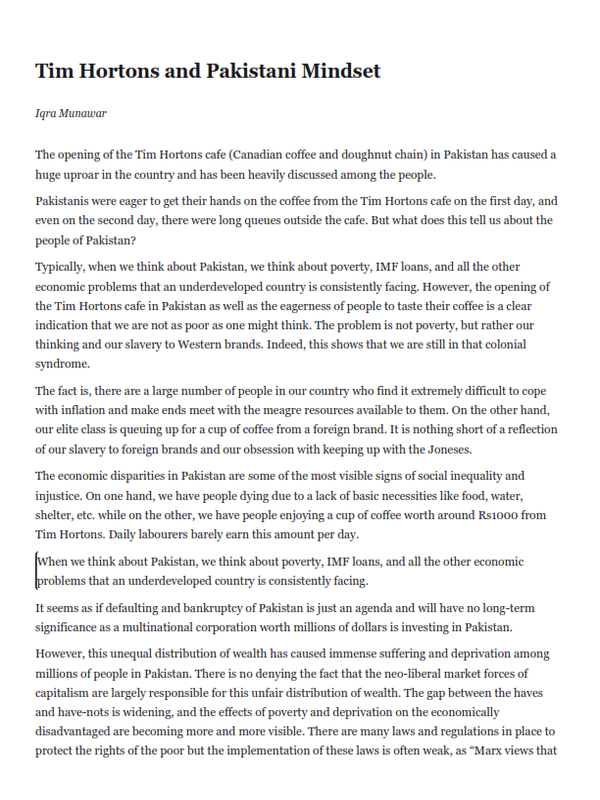Tim Hortons and Pakistani Mindset
The opening of the Tim Hortons cafe (Canadian coffee and doughnut chain) in Pakistan has caused a huge uproar in the country and has been heavily discussed among the people.
Pakistanis were eager to get their hands on the coffee from the Tim Hortons cafe on the first day, and even on the second day, there were long queues outside the cafe. But what does this tell us about the people of Pakistan?
Typically, when we think about Pakistan, we think about poverty, IMF loans, and all the other economic problems that an underdeveloped country is consistently facing. However, the opening of the Tim Hortons cafe in Pakistan as well as the eagerness of people to taste their coffee is a clear indication that we are not as poor as one might think. The problem is not poverty, but rather our thinking and our slavery to Western brands. Indeed, this shows that we are still in that colonial syndrome.
The fact is, there are a large number of people in our country who find it extremely difficult to cope with inflation and make ends meet with the meagre resources available to them. On the other hand, our elite class is queuing up for a cup of coffee from a foreign brand. It is nothing short of a reflection of our slavery to foreign brands and our obsession with keeping up with the Joneses.
The economic disparities in Pakistan are some of the most visible signs of social inequality and injustice. On one hand, we have people dying due to a lack of basic necessities like food, water, shelter, etc. while on the other, we have people enjoying a cup of coffee worth around Rs1000 from Tim Hortons. Daily labourers barely earn this amount per day.
When we think about Pakistan, we think about poverty, IMF loans, and all the other economic problems that an underdeveloped country is consistently facing.
It seems as if defaulting and bankruptcy of Pakistan is just an agenda and will have no long-term significance as a multinational corporation worth millions of dollars is investing in Pakistan.
However, this unequal distribution of wealth has caused immense suffering and deprivation among millions of people in Pakistan. There is no denying the fact that the neo-liberal market forces of capitalism are largely responsible for this unfair distribution of wealth. The gap between the haves and have-nots is widening, and the effects of poverty and deprivation on the economically disadvantaged are becoming more and more visible. There are many laws and regulations in place to protect the rights of the poor but the implementation of these laws is often weak, as “Marx views that power held by a particular group (elite class) in society at the expense of the rest of the society” which automatically lead to social injustice or inequality.
We, as Pakistanis, tend to view brands from the West as superior, finest, and best to anything available in our own country, and thus, try to buy products from these brands, even when there are good alternatives available in our markets. We never thought of supporting our local things. This is a form of mental slavery that keeps us from accepting and appreciating what is available in our own country.
This is why it is so important for us to be more conscious of our spending habits and to bring about a shift in our thinking. We should focus on helping local businesses to thrive and contribute to the growth of the economy instead of blindly following foreign kinds of stuff. It is only when we start looking inward and value our products that we will be able to make real progress.
The issue here is not about financial resources but rather about the thinking of the Pakistani people. It seems that many of us have been conditioned to think that the only way to be socially accepted, to look modern, or to look like an elite is to embrace foreign brands and products. We have been led to believe that if something is not ‘Gora’ (foreign), then it is not worthy of our attention.
It is important to understand that the availability of a Western brand in the Pakistani market does not necessarily indicate economic advancement. Instead, it is an indication of our flawed thinking and our willingness to be enslaved by Western brands. We need to learn to appreciate what is available in our own country and invest in our markets to make our economy more resilient and sustainable. We don’t need to keep up with the Gora brands instead, let’s work to make our brands just as successful as them and as iconic.
Tim Hortons is just an example of what goes on in daily life here. People of Pakistan do seem to indulge themselves in excessive shopping when it comes to sales on other brands as well. This shows the clear difference between the people of different classes. The rich are getting richer, and the poor are getting poorer. If only the rich invested in productive sectors of Pakistan, maybe the poor and the country would get something good out of it.
So it is not those queuing outside brands that we need to question, but let’s start asking questions to those who have created an environment where queuing up outside Tim Hortons for hours to get a cup of coffee seems like a fruitful activity.
The writer is associated with the Pakistan Institute of Development Economics (PIDE), Islamabad.




